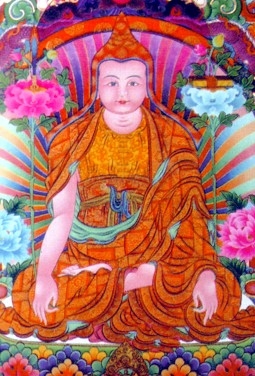Nyingtik Yabshyi: Difference between revisions
No edit summary |
No edit summary |
||
| Line 3: | Line 3: | ||
[[Longchen Rabjam]] also composed the [[Zabmo Yangtik]], which condenses the important [[pith instructions]] of both Vima Nyingtik and Khandro Nyingtik. | [[Longchen Rabjam]] also composed the [[Zabmo Yangtik]], which condenses the important [[pith instructions]] of both Vima Nyingtik and Khandro Nyingtik. | ||
As [[Nyoshul Khen Rinpoche]] explains: “For the purpose of the actual practice of [[Dzogchen]] according to the seventeen main tantras of Dzogpachenpo, Longchenpa gathered his own termas as well as those of [[Chetsün Senge Wangchuk]] (who was later reborn as [[Jamyang Khyentse Wangpo]]), and [[Pema Ledreltsal]] (Longchenpa’s previous incarnation) in the form of the thirteen volume collection known as the Nyingtik Yabshyi. This is the practice aspect of Longchenpa’s writings and the basis of the Old Nyingtik. In it he synthesized the Vima Nyingtik of [[Vimalamitra]] and the Khandro Nyingtik of [[Guru Rinpoche]] and explained all the practical details in the light of his own realization.” <ref>*As quoted in ''Dzogchen & Padmasambhava'', Rigpa Publications, page 85.</ref> | |||
==References== | |||
<small><references/></small> | |||
==Alternative Classifications== | ==Alternative Classifications== | ||
Revision as of 16:01, 7 August 2013

Nyingtik Yabshyi (Wyl. snying thig ya bzhi) literally means the 'Four Parts of the Nyingtik'. It consists of the Vima Nyingtik, Lama Yangtik, Khandro Nyingtik and Khandro Yangtik. The Vima Nyingtik and Khandro Nyingtik are known as the 'mother' Nyingtik texts and the Lama Yangtik and Khandro Yangtik are known as 'child' texts, hence another common name for the collection which is the Four Mother and Child Sections of Nyingtik (Tib. nyingtik ma bu shyi; snying thig ma bu zhi).
Longchen Rabjam also composed the Zabmo Yangtik, which condenses the important pith instructions of both Vima Nyingtik and Khandro Nyingtik.
As Nyoshul Khen Rinpoche explains: “For the purpose of the actual practice of Dzogchen according to the seventeen main tantras of Dzogpachenpo, Longchenpa gathered his own termas as well as those of Chetsün Senge Wangchuk (who was later reborn as Jamyang Khyentse Wangpo), and Pema Ledreltsal (Longchenpa’s previous incarnation) in the form of the thirteen volume collection known as the Nyingtik Yabshyi. This is the practice aspect of Longchenpa’s writings and the basis of the Old Nyingtik. In it he synthesized the Vima Nyingtik of Vimalamitra and the Khandro Nyingtik of Guru Rinpoche and explained all the practical details in the light of his own realization.” [1]
References
- ↑ *As quoted in Dzogchen & Padmasambhava, Rigpa Publications, page 85.
Alternative Classifications
There are two alternative traditions of classifying the Four Parts of the Nyingtik, mentioned in the Immaculate Oral Instructions, the Nyingtik teachings of Jamgön Kongtrul:
A second classification includes:
- Vima Nyingtik;
- Lama Yangtik;
- Khandro Nyingtik and Khandro Yangtik, counted as one; and
- Karma Nyingtik, which comes from the Third Karmapa, Rangjung Dorje.
A third way of classifying the four, according to the Dzogchen masters Kongpo Dzogchenpa and Katok Rigdzin Tsewang Norbu, is as follows:
- Vima Nyingtik;
- Lama Yangtik;
- Khandro Nyingtik and Khandro Yangtik, counted as one; and
- Dorsem Nyingtik of Kunkyong Lingpa.[1]
The Empowerments of Nyingtik Yabshyi
The empowerments have been given many times to the Rigpa sangha, including:
- Kyabjé Dilgo Khyentse Rinpoche, London, 1st July 1987 (Lama Yangtik and Khandro Nyingtik only)
- Kyabjé Penor Rinpoche, London, 11th - 15th November 1988 (all empowerments including Zabmo Yangtik)
- Kyabjé Dilgo Khyentse Rinpoche, Prapoutel, 20th and 21st August 1990 (Khandro Nyingtik only)
- Kyabjé Penor Rinpoche, Lerab Ling, 18th - 21st July 1995 (not including Zabmo Yangtik)
- Kyabjé Trulshik Rinpoche, Lerab Ling, 1st July 2003 (Lama Yangtik only)
- Kyabjé Trulshik Rinpoche, Lerab Ling, 1st - 3rd December 2005 (Lama Yangtik and Khandro Yangtik only)
Notes
- ↑ See the foreword to Great Perfection: Outer and Inner Preliminaries, by the Third Dzogchen Rinpoche, translated by Cortland Dahl (Ithaca: Snow Lion, 2008), page xi and Dezhung Rinpoche (2005) p. 171
Teachings Given to the Rigpa Sangha
- Orgyen Tobgyal Rinpoche, Lerab Ling, 3 August 2013
Further Reading
- Dezhung Rinpoche. snying thig ya bzhi'i rnam bshad in kun dga' bstan pa'i nyi ma, gsung 'bum, Dharamsala, 2005, pp.169-179
- Khenchen Namdrol Rinpoche, Nyingtik Yabshyi, Its Origins and Transmission